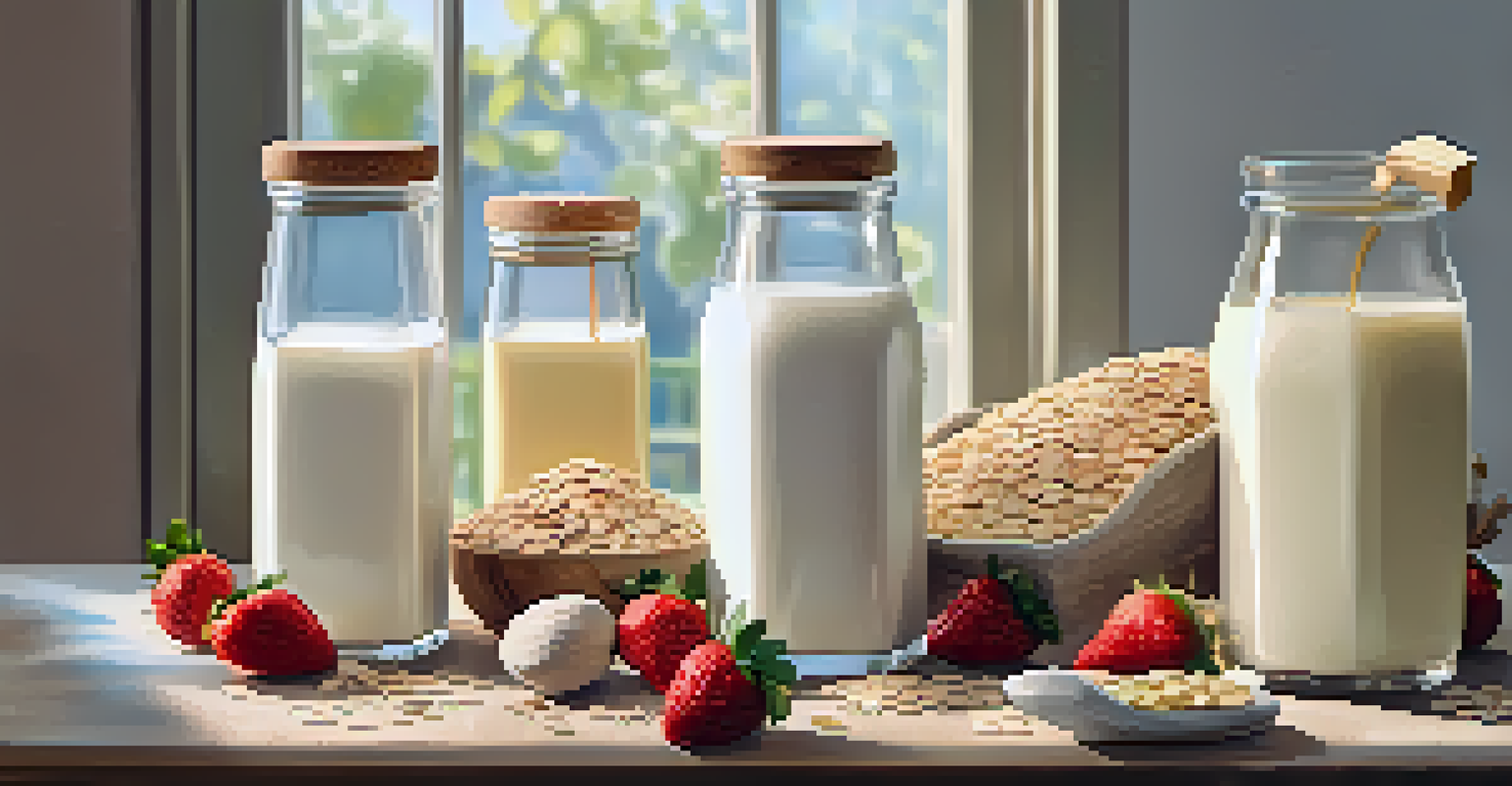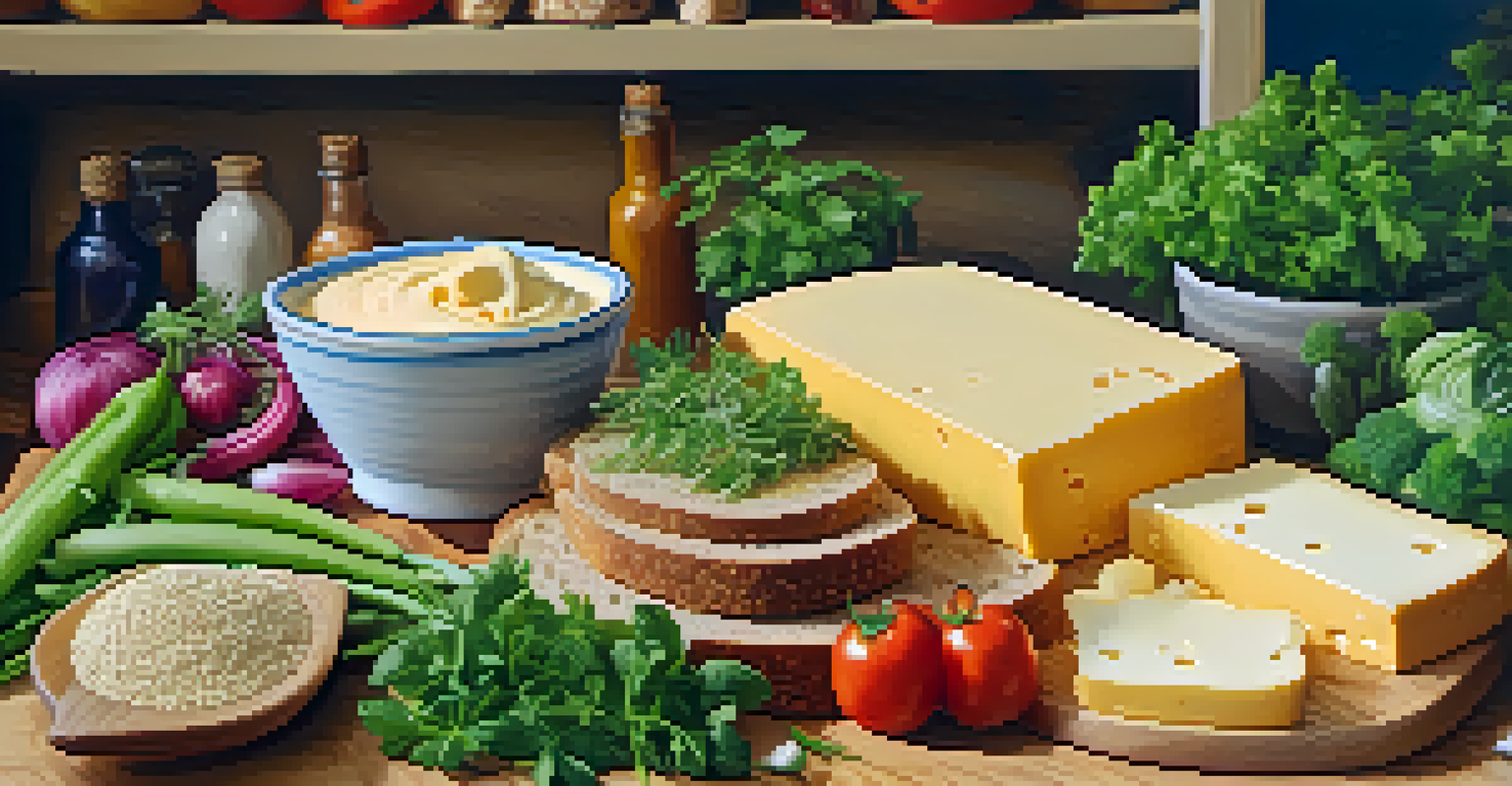Substitutes for Common Ingredients in Vegan Cooking

Replacing Eggs: Flaxseed and Chia Seeds
Eggs are often used in baking for binding and moisture, but there are excellent vegan alternatives. Flaxseed meal and chia seeds are two popular substitutes that can mimic the binding properties of eggs. To use them, simply mix one tablespoon of flaxseed meal or chia seeds with three tablespoons of water and let it sit for about 15 minutes until it becomes gel-like.
Let food be thy medicine and medicine be thy food.
These substitutes not only provide the necessary texture but also add a boost of omega-3 fatty acids, making your dish a bit healthier. Plus, they are incredibly easy to find in grocery stores or health food shops. Just remember to adjust your recipe slightly, as these substitutes may absorb some extra moisture.
In addition to baking, flaxseed and chia seeds can also be added to smoothies or oatmeal for a nutritional kick. They are versatile, which makes them a staple in many vegan kitchens. So, next time you find yourself out of eggs, reach for these seeds!
Dairy Milk Alternatives: Almond and Oat Milk
When it comes to dairy milk, there are plenty of tasty plant-based alternatives. Almond milk and oat milk are two of the most popular options that offer a creamy texture without the dairy. Almond milk has a slightly nutty flavor, while oat milk is known for its subtle sweetness, making them both great for coffee, smoothies, and baking.

These alternatives are not only lactose-free but also often fortified with vitamins and minerals, making them a nutritious choice. You can easily find them in most grocery stores, and they come in various flavors, such as vanilla or chocolate, to suit your preferences. Just be mindful of added sugars if you're watching your intake.
Vegan Egg Replacements Explained
Flaxseed meal and chia seeds can effectively substitute eggs in baking by providing binding properties and adding omega-3 fatty acids.
Experimenting with different plant milks can be a fun way to discover what works best for your recipes. Whether you’re making pancakes, sauces, or just enjoying a glass on its own, almond and oat milk are fantastic substitutes that keep your vegan cooking delicious.
Coconut Oil vs. Butter: A Creamy Swap
If you’re looking for a buttery flavor in your dishes without using dairy, coconut oil is a fantastic substitute. It can be used in a 1:1 ratio for butter in most recipes, whether you’re baking cookies or sautéing vegetables. The richness of coconut oil adds depth to your meals while keeping them plant-based.
The greatest wealth is health.
Another option to consider is vegan butter, which is specifically designed to replicate the taste and texture of traditional butter. These products often blend various plant oils to achieve that creamy goodness. Just keep an eye on the ingredients, as some brands may contain additives you might want to avoid.
Coconut oil also has a high smoke point, making it great for frying or roasting. Plus, it adds a subtle coconut flavor that can enhance tropical-themed dishes or desserts. With these options, you can still enjoy rich flavors while staying true to your vegan lifestyle.
Nut Butter Alternatives: Sunflower and Soy Nut Butter
Nut butters are rich, creamy, and perfect for spreading on bread or adding to smoothies. However, for those with nut allergies, sunflower seed butter and soy nut butter are excellent alternatives. Sunflower seed butter has a mild flavor and creamy texture, making it a great choice for sandwiches or as a dip for fruits and veggies.
Soy nut butter offers a similar consistency to peanut butter but is made from roasted soybeans, providing a unique taste that pairs well with many dishes. Both alternatives can be used in recipes calling for nut butters, but they may require slight adjustments to account for different flavors and consistencies.
Plant-Based Milk Options Available
Almond and oat milk serve as delicious dairy alternatives with unique flavors and added nutritional benefits.
These substitutes not only cater to nut allergies but also provide a source of protein, vitamins, and healthy fats. Whether you’re making a snack or a meal, sunflower and soy nut butter can easily fit into your vegan cooking repertoire.
Honey Substitutes: Agave and Maple Syrup
For those who love a touch of sweetness, honey is often a go-to for many recipes. However, in vegan cooking, agave nectar and maple syrup serve as excellent substitutes. Agave nectar is sweeter than honey, so you might need to adjust the amount you use, while maple syrup adds a rich, caramel-like flavor that works wonderfully in desserts and breakfast dishes.
Both of these alternatives are also plant-based and can easily be found in most grocery stores. They can be used in equal parts in recipes that call for honey, making them easy to incorporate into your cooking. Plus, they come with their own unique health benefits, such as antioxidants in maple syrup.
So, whether you're drizzling it on pancakes or sweetening your tea, agave and maple syrup provide delicious options that keep your meals vegan-friendly. Embrace these sweeteners to continue enjoying your favorite treats without compromising your values.
Vegan Cheese: Nutritional Yeast and Cashew Cheese
Cheese lovers often find it challenging to give up cheese when transitioning to a vegan diet, but vegan cheese options are surprisingly versatile. Nutritional yeast is a fantastic substitute that provides a cheesy flavor in dishes without any dairy. It can be sprinkled on popcorn, pasta, or incorporated into sauces for a creamy texture.
Another popular option is cashew cheese, which is made by blending soaked cashews with nutritional yeast, garlic, and lemon juice. This creates a rich, creamy spread that can be used in sandwiches, dips, or even as a pizza topping. Both options are not only delicious but also packed with nutrients, including protein and B vitamins.
Healthy Swaps for Baking Ingredients
Using alternatives like coconut oil and almond flour not only maintains flavor but also caters to various dietary needs.
These alternatives allow you to enjoy cheesy flavors without compromising your dietary choices. With a little creativity, you can whip up vegan cheese dishes that satisfy your cravings while keeping things plant-based and healthy.
Flour Alternatives: Almond and Coconut Flour
When it comes to baking, traditional all-purpose flour is a staple, but there are great alternatives that cater to different dietary needs. Almond flour is a popular gluten-free option that adds a nutty flavor and moist texture to baked goods. It's particularly great for cookies or cakes, and it offers a higher protein content compared to regular flour.
Coconut flour is another option that is high in fiber and absorbs a lot of moisture, so you’ll need to adjust the liquid in your recipes accordingly. While it has a distinct coconut flavor, it works well in pancakes and muffins. Both almond and coconut flour can transform your baking into a healthier affair without losing taste.

These alternatives open up a world of possibilities for those with gluten sensitivities or those simply looking to add variety to their meals. So, go ahead and experiment with these flours to discover new textures and flavors in your vegan cooking!